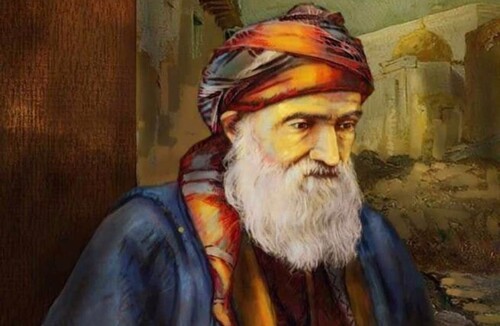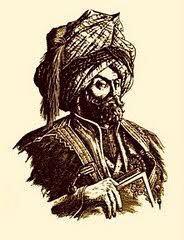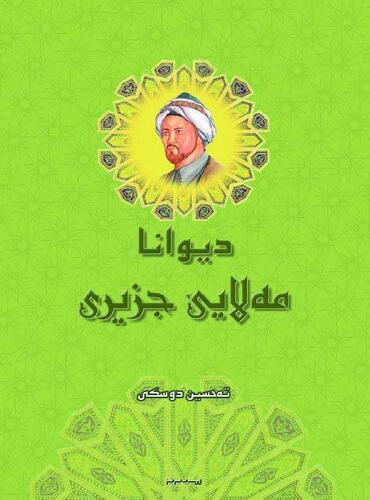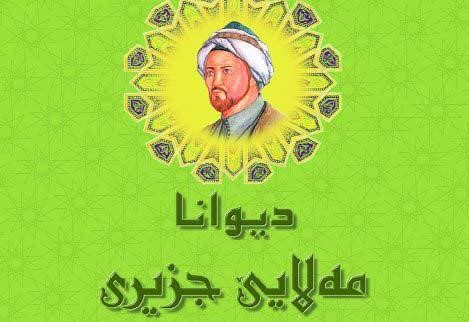Dr. Azad Mukri
Mullah Jaziri and descending to the Earth:
As it is mentioned, Mullah Jaziri has talked about earthly love in his poems, too. For example, he has a long ode for describing an ordinary person. Sometimes this person is a beautiful woman, girl, or lady and sometimes it is a great and glorious Mir or Amir.
The ode that is directly about a woman's love is called "Good Morning my lady".
As we mentioned Mullah Jazir has some poems that are about earthly love towards a person. These kinds of poems can be classified into two groups. A part of them is those poems that are less popular in Kurdish literature called "Madhiyeh" (Praising) or King's Favorites, most of which were adopted from the literature of the regional lands that had a state.
For instance, in Persian literature, during the fourth, fifth, and sixth, and even the later centuries, the majority of Persian poems were about praising the kings and authorities. Obviously, this kind of poem that is just for praising the characters does not have great value and socially they cannot be classified as public serving or aesthetic serving works. However, it is very important that Persian poets like "Roudaki Samarqandi", "Anvari", "Khaqani" and "Qa'ani" and many others had written Madiha (Praise poems) on the serious part of their works but these poems have helped the Persian language to be preserved and practiced so that it becomes a fluent language. It resulted in making this language a rich and well-formed one.

What is interesting in this part of Mullah Jaziri's works is that it has been said many times that Kurds did not have a court or kings thus they did not have the tradition of Madiha (Praise poems); so in this way, the Kurdish language would be practiced and developed, which is somehow a true statement. However, Mullah Jaziri has two long odes that are written to praise "Botan Mir" and "Mir Sharafkhan". Obviously, Botan's Mir and Mir Sharafkhan were among the powerful authorities of the Safavids era. They were Botan's Amir for a while and then they became Btlis's governor. Sharafkhan Btlisi, the author of Sharafnameh history book, was once the governor of the north of Iran like Tonekabon. What is interesting is that Mullah Jaziri considered Botan's Mir and Mir Sharafkhan as Kurdish kings and as Sharafkhan Btlisi had written the history book of Sharafnameh about Kurdish history shows that he, as a governor of the Safavids era i.e., five centuries ago, had the dream of the humanitarian demand of the Kurds which is Kurdish history and language. Thus, a poet like Mullah Jaziri, as great poet and linguist as he was, wrote two long odes for that Amir, one of which is called "Botan's Mir's Favorite" which begins with this verse:
Oh, great king, the Almighty God may protect you
The Verse of Inna Fatahna may watch you
(Inna Fatahna is a verse from the Qur'an)
This is a long ode with twenty-two verses. In another ode named "Mir Sharaf's Favorite" which is also a twenty-two-verse ode, he talks about the greatness of Kurds' Mir, Mir Sharaf, differently. That ode begins with this verse:
Hey the greatest Khan who is a shining star, I hope you shine brighter
I hope your fate's ship stays away from any disagreeable winds

Mir Sharaf Khan Bdlisi
This ode, again, talks about the greatness and majesty of Mir Sharaf Khan, or Sharaf Khan Bdlisi who was the governor of Jazir and Botan. Clearly, in addition to Mir Sharaf Khan, the Kurds had many high ranked figures who were originally Kurds but were governors of other regions but the question is why other poets did not write any praise poems about them? The reliable answer to this question is that those governors were only from Kurdish ancestors but they did not believe in Kurdish language and culture thus the poets did not consider them and ignored them.
As we said in love poems, Mullah Jaziri, in his one hundredth ode called "Good Morning my Lady" that he has applied Tarji' Band style, he ignored all the supernatural symbols and from the very first line he talks to a human, a human being that we all know and have experience love and passion with them. That is, his language changes from a complex form full of symbolic phrases into a simple and easy to understand language. Thus, this poem has a much simpler language compared to other poems of his. He talks to a human. This human can be described by some personal characteristics. Although the point of view is a traditional one that is these characteristics can be seen in a woman and a human who have beautiful appearance, what is important is that Mullah Jaziri deviates from the traditional love and he experiences a humanitarian form of love in this ode.
Good morning my Lady, my sweet queen
You are my soul, may my life be sacrificed for you
Praise to God for your being, how sweet character you are!
You are not sugar, you are soul and life
Oh, my life and my soul, good morning you lady
Come my eyes' light, I would like to see you

This poem's main characteristic is that not only does the poet's view of the heavens incline toward the earth, but the poem's language changes to a much simpler form compared to the complex mystical poems Mullah Jaziri has written.
In his one-hundred and ninth ode known as "Kurdistan's Night Torch", another characteristic adds up to the rest of the aesthetic sense of Mullah Jaziri. And that is he mentions the name of a land directly called Kurdistan in his poem and he is in love with a lady from Kurdistan.
I am totally strange with your religion lady
I am amazed by you from head to toe
This poem which is written in five sections also talks about human and Kurdish love. In this text, Mullah Jaziri clearly reveals his lover and the place and time of this love. This text describes an earthly love with a bright face that is not vague or hidden.









